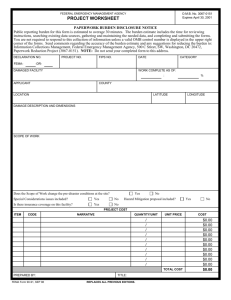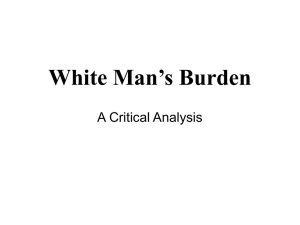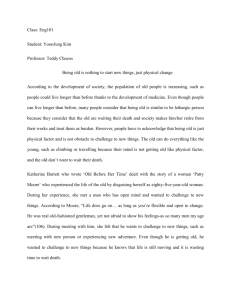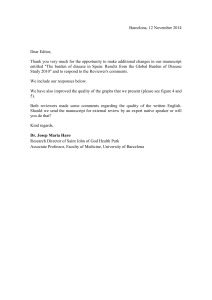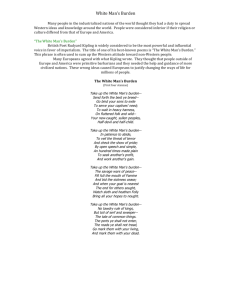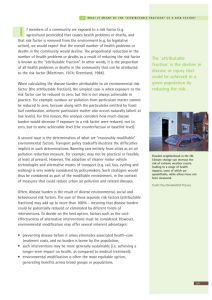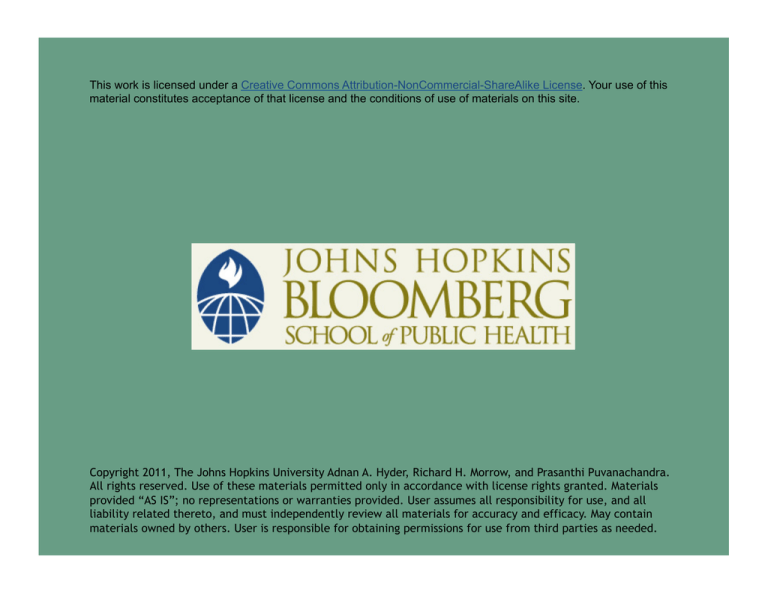
This work is licensed under a Creative Commons Attribution-NonCommercial-ShareAlike License. Your use of this
material constitutes acceptance of that license and the conditions of use of materials on this site.
Copyright 2011, The Johns Hopkins University Adnan A. Hyder, Richard H. Morrow, and Prasanthi Puvanachandra.
All rights reserved. Use of these materials permitted only in accordance with license rights granted. Materials
provided “AS IS”; no representations or warranties provided. User assumes all responsibility for use, and all
liability related thereto, and must independently review all materials for accuracy and efficacy. May contain
materials owned by others. User is responsible for obtaining permissions for use from third parties as needed.
Applications of Summary Measures: Case Studies
Prasanthi Puvanachandra, MB BChir, MPH
Johns Hopkins University
Outline
Use of HeaLYs
- Canadian public health unit and Mandatory Health Programs and
Services Guidelines (MPGs)
Use of DALYs
- Comparative Risk Assessment (CRA) and environmental health
DALY vs. HeaLY
- Burden of cancer in Korea
3
Using HeaLYs to Assess Programming Needs in a
Public Health Unit
Source: Heale, M.A. et al. Canadian Journal of Public Health, 91(2),148-152.
Mandatory Health Programs and Services Guidelines
December, 1997: Ontario MoH mandated public health units in
Ontario to address population health in specific areas
-
-
-
-
-
-
Chronic diseases
Injury and substance abuse
Early detection of cancer
Child health
Reproductive health
Infectious diseases
Identified needs assessment as first step in this process
5
Needs Assessment
Wellington and Dufferin counties
Used HeaLYs methodology to assess population health needs and
discuss implications for resource allocation to meet requirements
for MPGs
Utilized simple spreadsheet methodology
6
Inc * {(CFR*dExF)+(CDR*ExtD*dcDT)}
Variable
Data source
Incidence, Age 0
Cancer: Ontario Cancer Registry
Infectious disease: reportable disease
Information systems
Others: hospital data
Age F
Hospital mortality data: ICD 9 codes
ExO
Coale & Demeny level 26 (looking at natural history
of disease)
CFR
Annual deaths/annual incidence (from above data
sources)
CDR
Taken as 1 when hospitalization used as incidence
(also Ghana and GBD study)
ExtD
Disability indices developed by international panel
of experts from WHO
Dt
Hospital data, registries, and GBD study
7
Disability Variables for Injury from MVC
Source: Heale, M.A. et al. Canadian Journal of Public Health, 91(2),148-152.
8
Input Data: Years of Healthy Life Lost
Source: Heale, M.A. et al. Canadian Journal of Public Health, 91(2),148-152.
9
Years of Healthy Life Lost by Cause
Source: Heale, M.A. et al. Canadian Journal of Public Health, 91(2),148-152.
10
Outcome of Needs Assessment
Cardiovascular disease (CVD) = greatest burden
- 1st: all other heart disease
-
-
2nd: ischemic heart disease
5th: cerebrovascular disease
80 YHLL
Suicide/attempted suicide: 2nd
Depression: 3rd
Chronic obstructive pulmonary disease (COPD): 6th
Ranking of years of healthy lives lost (YHLL) in Ontario was similar
to the WHO’s ranking of DALYs for developed countries in 1990
11
Comparing MPGs with Needs Assessment
MGPs list of diseases
Priority
Needs assessment
findings
Ranking
Chronic disease
1
Other HD
1
Unintentional injury
2
IHD
2
Substance abuse
3
Suicide
3
Cancer
4
Depression
4
Child health
5
Cerebrovascular disease
5
Reproductive health
6
COPD
6
Infectious diseases
7
Lung cancer
7
12
Comments
MPGs do not address some of the diseases/conditions which are
responsible for a significant loss in healthy life
HeaLYs also used to monitor change in health need, therefore used
to evaluate programs with the MPG
Suggested resource allocation
- Chronic diseases: cardiovascular disease (CVD), asthma, chronic
obstructive pulmonary disease (COPD), diabetes, cancer
-
-
-
-
Early detection programs: breast cancer
Injury and substance abuse: alcohol dependence, motor vehicle
crashes, falls
Other areas needing attention: mental health as a separate
needs category—suicide, depression, dementia (18th)
Old age conditions: osteoarthritis (10th)
13
DALYs and the Environment
Morrow, Hyder, Puvanachandra
Environmental Disease Burden
Estimates of the attributable fraction of the total global burden of
disease to the environment range from 2% to 80%
World Bank, World Development Report (1993): 50%
WHO Rio Earth Summit (2003) revised figure to 25% of Global DALYs
being attributable to environment
Comparative Risk Assessment (2007): 25%-33%
15
Comparative Risk Assessment (CRA)
CRA carried out by WHO was first comprehensive evaluation of the
global and regional burden of disease due to major risk factors
Risks from major environmental hazards were analyzed and
compared to non-environmental hazards such as smoking, unsafe
sex, and malnutrition
16
Selection of Risk Factors: Criteria
They were among the leading causes of disease burden
They were not too specific (for example, every one of the hundreds
of air pollutants) or too broad (for example, the environment as a
whole)
The likelihood of causality was based on scientific knowledge
Sufficient data on exposure was available
They were potentially modifiable
17
CRA Findings
Modifiable environmental risk factors contribute to 24% (21-27%) of
global burden of disease (reported in DALYs)
353,572 DALYs were reported for the global burden with 187,839
DALYs among children aged between 0-14 years
36% of all deaths amongst children (0-14) were attributable to
modifiable environmental risk factors (diarrhea, malaria, and
respiratory tract infections together equal more than 24% of all
deaths)
Infant death rate from environmental causes was 12 times higher in
developing than in developed countries
18
Health Burden due to Environmental Risk Factors
Ranking of health burden due to environmental risk factors in 2000 by development status
(% total disability adjusted life-years lost due to each risk factor)
High mortality developing
countries
Low mortality developing
countries
% of
burden
Rank
Underweight
14.7
1
Unsafe sex
10
Unsafe water,
sanitation, and
hygiene
Developed countries
% of
burden
Rank
% of
burden
Rank
Alcohol
6.3
1
Tobacco
12.2
1
2
Blood pressure
5.0
2
Blood pressure
10.9
2
5.5
3
Tobacco
4.0
3
Alcohol
9.2
3
Lack of vaccines
5.3
4
Road traffic
3.3
4
Cholesterol
7.5
4
Indoor smoke
3.6
5
Underweight
3.1
5
Overweight
7.4
5
Occupation
1.1
14
Occupation
2.4
7
Road traffic
1.9
8
Climate change
0.61
20
Indoor smoke
1.9
10
Occupation
1.5
10
Road traffic
0.31
24
Unsafe water
1.8
12
Urban air
0.55
15
Environmental risk factors shown in bold
Source: Smith & Ezzati, 2005. Adapted from McMichael, Kjellstrom & Smith. Chapter 9 – Environmental health. In
International public health, diseases, programs, systems and policies (Second Edition). Merson Black and Mills.
19
Environmental Disease Burden in Selected Countries
Environmental disease burden in selected countries by World Health Organization region
Global burden of disease
attributable to the environment
WHO region
Africa
Europe
Eastern
Mediterranean
South East Asia
Western Pacific
Americas
Burden of
disease
attributable to
indoor air
(DALYs/1000
per capita/
year)
Burden of
disease
attributable to
traffic injuries
(DALYs/1000
per capita/
year)
Country
DALYs/1000 per
capita/year
[world lowest:
14, highest:16]
% of total
burden of
disease
Burden of disease
attributable to
water, sanitation
and hygiene
(DALYs/1000 per
capita/year)
Angola
Ghana
Botswana
Russian
Federation
Turkey
Pakistan
Egypt
Bangladesh
Viet Nam
Thailand
China
Philippines
Tonga
Bolivia
Brazil
Cuba
304
93
91
37
27
13
109
14
6.6
57
7.5
2.6
8.9
4.0
2.4
54
20
0.3
0.0
3.7
30
83
38
65
38
39
34
39
30
65
37
23
19
28
19
25
22
19
22
20
19
24
18
16
3.0
22
6.0
14
4.0
2
3.0
5.0
3.0
15
3.6
1.0
0.9
14
0.2
9
2.0
1.5
2.5
3.0
1.6
5
0.6
0.3
1.2
1.8
1.8
2.0
2.0
4.2
2.3
1.4
0.9
2.7
2.7
1.8
Source: World Health Organization (2007). Environmental burden of disease: Country profiles. Geneva.
www.who.int/quantifying_ehimpacts/countryprofiles/en/index.html
20
DALY and Environmental Interventions
Environmental health risks are largely preventable by interventions
that often involve sectors other than health
-
For example, energy, transport, agriculture
Few studies using DALY as indicator of effectiveness in economic
analysis of environmental interventions
-
-
-
-
Water connections in rural areas: $35 per DALY saved
Malaria control: $35-70 per DALY saved
Improved stoves (indoor air): $50-100 per DALY saved
Kerosene or LPG stoves: $150-200 per DALY saved
21
Measuring the Burden of Major Cancers due to
Smoking in Korea
DALY and HeaLY
Disease Burden in Korea
Korean Association of Smoking and Health estimates 35,000 deaths
per annum (2000) due to smoking-related diseases
Economic loss due to premature death exceeding 3 trillion won
(approx 2.5 billion USD)
Smoking rate among Korean men is one of the highest in the world
Of all cancer-related deaths, 35% attributable to smoking (28% due
to lung cancer, 7% due to other cancers)
23
Estimating Disease Burden of Major Cancers in Korea
Used BOTH DALYs and HeaLYs to assess the true disease burden of
cancer in Korea
-
-
-
-
Selected smoking-related diseases by systematic reviews
Estimated smoking-related attributable risks using relative risks
and age-specific smoking rates
Estimated some epidemiological indicators of major cancers
such as incidence, CFR, etc.
Calculated DALY and HeaLY values of major cancers in Korea
24
Data Sources
Incidence and disability indicators: social health insurance claim
data
-
Patients who sought health care for the first time in given time
period considered as incident cases
CFR: national registries maintained by National Statistical Office
(NSO)
Dt: DISMOD method developed by GBD group
ExtD: Global Burden of Disease Study estimates
25
DALY Results
Men
YLL
Cancer
Lip, oral cavity,
pharynx
Esophagus
Pancreas
Larynx
Trachea, lung,
bronchus
Cervix uteri
Urinary bladder
Kidney, other
urinary
Stomach
Liver
Colorectal
Total
Women
YLD
n
%
n
%
23.6
23.5
76.9
76.5
62.2
32.4
30.7
34.0
61.5
74.6
409.5
DALY
YLL
YLD
DALY
n
%
n
%
100.5
1.6
4.9
31.3
95.1
33.0
120.7 66.0
20.3 38.5
10.5 25.4
182.9
52.7
41.2
3.3
6.3
3.7
4.9
90.1
62.8
64.4
0.7
2.2
95.1
9.9
37.2
67.7
7.0
5.9
85.2
71.4
14.8
480.9
71.0
73.5
25.6
26.5
96.6
NA
13.0
23.2
NA
43.1
76.8
NA
56.2
3.6
1.0
12.0
45.8
26.3
1.2
88.0
54.2
29.9
2.2
11.9
32.4
24.7
67.6
36.6
0.3
26.2
0.8
73.8
1.1
251.1
132.3
35.5
1000.2
50.4
51.8
15.7
51.8
246.7
123.1
190.4
927.8
49.6 497.8
48.2 255.4
84.3 255.9
48.2 1930.1
37.4
5.5
4.1
137.8
57.8
20.0
25.2
39.2
27.3
22.0
12.2
214.0
42.2 64.6
80.0 27.5
74.8 16.3
60.8 351.8
Units are person-years per 100 000 people. NA, not applicable; YLD, years lived with
disability; TLL, years of life lost.
26
HeaLY Results
Men
Cancer
YHLLpm
n
Lip, oral cavity,
pharynx
%
Women
YHLLd
n
%
YHLL
YHLLpm
n
%
YHLLd
n
%
YHLL
19.8 20.6
76.4 79.4 96.2
1.2
7.6
14.9 92.4 16.1
Esophagus
46.9 21.3
Pancreas
27.6 48.1
Larynx
22.7 43.1
Trachea, lung,
311.8 63.7
bronchus
Cervix uteri
NA
Urinary bladder 0.0
0.0
Kidney, other
10.8 20.0
urinary
Stomach
160.6 51.7
Liver
69.9 30.7
Colorectal
20.3 13.7
172.9 78.7 219.8
29.7 51.9 57.3
29.9 56.9 52.5
2.1
4.1
2.7
4.1
63..5
48.9
55.7 95.9 58.1
2.3 36.5 6.4
2.8 51.1 5.5
177.9 36.3 489.7
47.1
55.5
37.8 44.5 84.9
NA
NA
28.9 100.0 39.7
2.7
0.6
12.3
38.7
19.3 87.7 22.0
1.0 61.3 1.6
34.5 80.0 43.0
0.2
18.6
0.7
146.3 48.3 306.8
157.8 69.3 227.7
127.8 76.3 148.1
1681.
982.0 58.4
3
20.3
3.0
2.4
25.2
12.7
17.1
60.2 74.8 80.5
20.5 87.3 23.5
11.7 82.9 14.1
86.7
27.6
226.9 72.4 313.6
Total
699.3 41.6
81.4
0.9
27
Burden of Cancers due to Smoking: Korean Men (2001)
Cancer
DALY
DALY rank
HeaLY
Stomach
Trachea, lung, bronchus
Liver
Colorectal
Esophagus
Lip, oral cavity, pharynx
497.8
480.9
255.4
225.9
182.9
100.5
56.2
52.7
41.2
36.6
1
2
3
4
5
6
7
8
9
10
306.8
489.7
227.7
148.1
219.8
96.2
43.5
57.3
52.5
39.7
Urinary bladder
Pancreas
Larynx
Kidney, other urinary
HeaLY
rank
2
1
3
5
4
6
9
7
8
10
Units are person-years per 100 000 people. DALY, disability adjusted
life years; HeaLY, healthy life years lost
28
Burden of Cancers due to Smoking: Korean Women
Burden of major cancers due to smoking in Korean women (2001)
Cancer
DALY
DALY rank
HeaLY
Trachea, lung, bronchus
Esophagus
Stomach
Lip, oral cavity, pharynx
Cervix uteri
Liver
96.6
67.7
64.6
33.0
29.9
27.5
16.3
7.0
5.9
2.2
1.1
1
2
3
4
5
6
7
8
9
10
11
85.0
58.1
80.5
16.1
22.0
23.5
14.1
6.4
5.5
1.7
0.9
Colorectal
Pancreas
Larynx
Urinary bladder
Kidney, other urinary
HeaLY
rank
1
3
2
6
5
4
7
8
9
10
11
Units are person-years per 100 000 people. DALY, disability adjusted
life years; HeaLY, healthy life years lost
29

